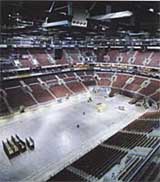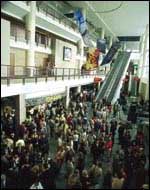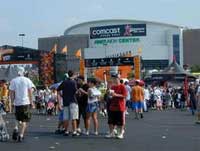The NCAA Division I Men’s Ice Hockey Committee meets in Indianapolis next week, and one item on the agenda is selecting the location for the 2007 and 2008 Frozen Four. Five cities are set to make in-person presentations to the committee: St. Paul, Detroit, Denver, St. Louis and Philadelphia.
St. Paul has hosted a number of times before, the most recent coming in 2002 at the new Xcel Energy Center. The event was well run, and the building is stellar, and there is a general consensus the city will get one of the two open bids.
Which leaves Denver, St. Louis, Detroit and Philadelphia for one spot, with the City of Brotherly Love holding perhaps the most intriguing bid of all.
Philadelphia and its First Union Center has never put in a bid before, and doesn’t have a Division I team in town. But it has a history of hosting big events, is in a huge media market with a popular NHL team, and has a state-of-the-art building. It’s a so-called non-traditional college hockey market, but it’s a huge hockey market.

“It’s a great way for the NCAA to come into a market which is now developed very strongly, and I think you’ll see a boost in youth hockey,” says Peter Luukko, president of Comcast-Spectacor, the sports arm of media giant Comcast, which owns the First Union Center. “And kids are seeing exciting hockey and seeing the opportunities they have to further their education and play hockey. It’s a chance for the NCAA to further develop a burgeoning market.”
There is a sense the committee would like to give bids here and there to so-called non-traditional cities. Part of that is the hope of “spreading the gospel” of college hockey, but largely, given how big the Frozen Four has become, there are just very few arenas in the “traditional” areas that are big enough to host the event anymore. Only Boston, St. Paul, Buffalo, Detroit, Denver and Columbus are NHL buildings in areas that have Division I college hockey.
But just as importantly, because the event has gotten so big, the operators of NHL buildings and the convention bureaus in those cities are eager to get involved with what’s become a surefire money maker.
“Our focus as a city is to go after the biggest and best kinds of events and championships,” says Larry Needell, president of the Philadelphia Sports Congress, the sports arm of the Philadelphia Visitors and Convention Bureau. “Because we have such a full event calendar, we make sure if we’re going after something that it’s a premier event. We’re aware that the Frozen Four is one of those events that sells out annually. There’s a tremendous travelling fan base and certainly we’re interested in filling hotels.”
Comcast-Spectacor — which owns the Philaelphia Flyers, the AHL’s Philadelphia Phantoms, the NBA’s Philadelphia 76ers, the old Spectrum and the new First Union Center, among other things — has been interested in hosting the Frozen Four for a while, according to Luukko, and finally found the right fit with the MAAC and Rider University to submit the bid.

Philadelphia people initially started conversations with the MAAC during the MAAC men’s basketball tournament held in Trenton, N.J. this past year (Rider, which doesn’t have a varsity hockey program, is located in nearby Ewing, N.J). Trenton’s Sovereign Bank Arena is operated by Global Spectrum, the building management unit of Comcast-Spectacor. At first, they thought of hosting a regional in Trenton, but decided instead to focus their energy on the whole enchilada, back in the home office at the First Union Center — home for the Flyers and 76ers, which seats 19,500 for hockey.
Despite Philadelphia being new to the college hockey process, the MAAC is not, having just hosted the 2003 Frozen Four in Buffalo.
Of course, the Philadelphia people can also rattle off the big events the city has hosted since the First Union Center opened in 1996, starting with the World Cup of Hockey that summer. There’s the women’s basketball Final Four, the men’s basketball NCAA regional, the national figure skating championships, the X-Games, the NBA All-Star Game and the Republican National Convention.
“We have a good package, but NCAA events are very similar,” Luukko says. “There’s always generally some awards, the major meetings, major press areas … So the name under the event may be different, but we’re pretty used to hosting these big events.”
Philadelphia would be the largest media market (fourth) ever to host the Frozen Four, other than Anaheim/Los Angeles, while having the added advantage of being much closer to a true hockey country.
By contrast, St. Louis is 22nd in media market size and Denver is 18th. Of course, the drawback is, an event like the Frozen Four can get lost in a town so big, and focused on the NHL and NBA playoffs, especially in a place where college hockey is not really on the media’s radar screen.
“We’re in a major Northeast media market, but at the same time, the event won’t get lost in the city,” Luukko says. “It will take the city over and be big news. So they’ll get that community feeling that the event is very important, but at the same time the advantage of being close to New York, Boston and Washington. So we’ve got that big league city with the small town feel.”
The beauty of a place like St. Paul — and “old-school” places like Providence and Albany for that matter — was the ease of getting from event to event. The main hotels, the arena and things like the Hobey Baker Award ceremony were all within walking distance of each other.

Possibly hurting Philadelphia is that the arena area only has one hotel within walking distance, and downtown — known as Center City — is not that far, but is still three miles away.
“We’re seven minutes from downtown, so we’re not in the suburbs,” says Luukko. “And the transportation will be perfect. The NCAA has never been concerned about that when they’ve come on a site visit. We have the subways. With a major event like this, not everyone is going to be able to walk to it anyway. The convention bureau does a great job of arranging for transportation.”
For those concerned hotels cost more in a larger city, Luukko is ready with an answer.
“We’ve got a great relationship with the hotels,” he says. “The rates are some of the better rates you’ll see.”
The hockey lineage of Comcast-Spectacor goes back to Ed Snider owning the Flyers as a family-run operation. After bringing the 76ers on board, then selling the teams, The Spectrum and the rights to the new building to Comcast, the newly-born Comcast-Spectacor started up the AHL’s Philadelphia Phantoms to play in the old building. A few later, they opened a series of youth hockey facilities in the area, and began Global Spectrum, which operates hockey facilities like New Hampshire’s Whittemore Center and World Arena in Colorado Springs.
“Because of our involvement in hockey over the years, from the highest levels even to guys like myself who have coached youth hockey, we have a good feel for what hockey people want, who we’re dealing with, and the type of service we have to provide for them,” Luukko says. “I think that’s the real advantage for us, not only owning the Flyers at the major level, but the Phantoms and all the rinks we own.
“We’re pumped up, and we’re putting the full force behind this.”


